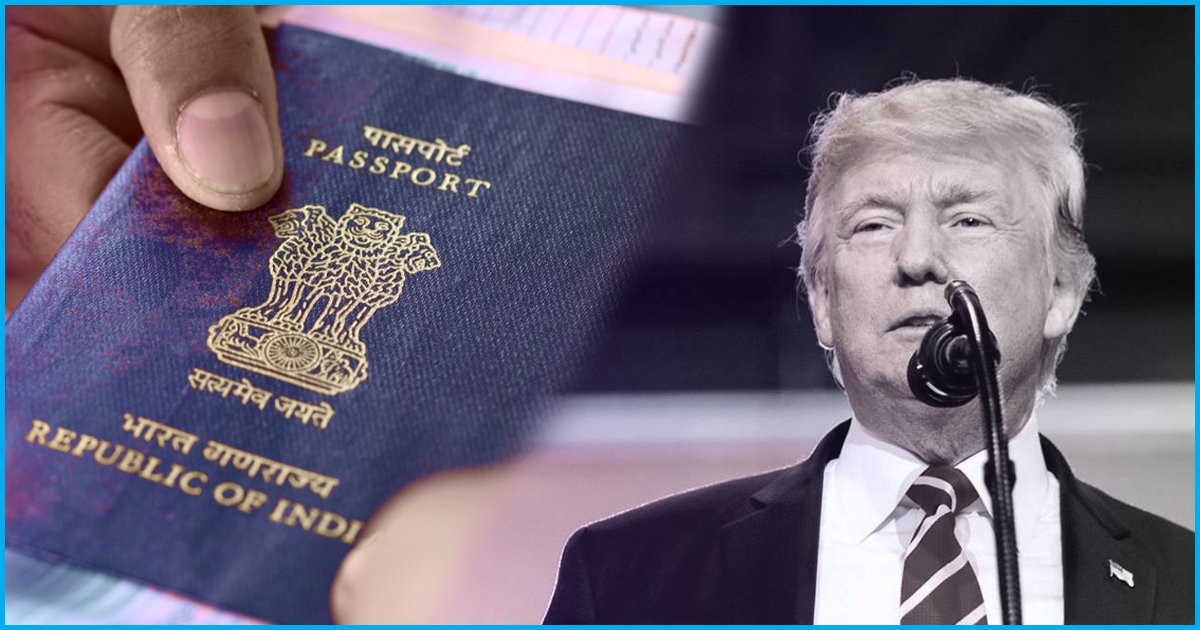
Good News For Indians Residing In US; No Change In H-1B Visa
9 Jan 2018 9:35 AM GMT
A good news for Indian techies residing in the United States of America as US Authorities today said that the Trump government is not considering any proposals that would force H-1B visa holders out of the country. This announcement comes months after reports emerged that the Trump administration was considering tightening H-1B visa rules that could lead to deportation of 7,50,000 Indians.
An official from the US Citizenship and Immigration Services (USCIS) said that “is not considering a regulatory change that would force H-1B visa holders to leave the United States by changing the interpretation of section certain language in Section 104 C of the American Competitiveness in the 21st Century Act (AC21) statute that states that USCIS may grant the extensions,” as reported by Economic Times.
What are H-1B Visas?
The H-1B is a temporary, non-immigrant work visa in the United States. It allows American employers to temporarily employ foreign workers. Under the H-1B programme, US employers recruit foreign workers to work in “speciality occupations” – these include jobs in fields like mathematics, engineering, and technology. The duration of stay is three years, extendable to six years. The number of foreign nationals who may be issued H-1B status each fiscal year is currently at 65,000.
H-1B employees are eligible to receive Social Security benefits. For this, they have to pay Social Security and Medicare taxes as part of their payroll. H1B visa holders can apply for a Green Card (for permanent residence in the US), though this has become a long and complicated process in recent years. In rare cases, the employers sponsor the green card. But even that is complicated.
As for citizenship, once a Green Card is obtained there is a waiting period before one can apply to become citizens of the United States.
H-1B visas are in demand all over the world. Last year, the quota of 65,000 was filled within days, and a lottery system was followed to deal with the high number of applications.
H-1B in the Indian context
According to the US Department of Homeland Security, around 70% of H1B visas were given to workers from India.
The demand for Indian workers is high, and in recent years this has been criticised due to the trend of employers using H-1B visas even after their expiry for outsourcing American jobs. While tech firms claim they use these visas to hire highly skilled workers, the majority of the visas are awarded to outsourcing firms from India. This has drawn the ire of US politicians, who say this decreases employment opportunities for Americans, as employers would rather outsource jobs overseas where wages are cheaper and talent more diverse.
H-1B in the American context
As mentioned above, H-1B visas are regarded as detrimental to American interests.
“The [H-1B] program was intended to serve employers who could not find the skilled workers they needed in the United States … employers are supposed to recruit Americans before they petition for an H-1B worker … [However,] over the years, the program has become a government-assisted way for employers to bring in cheaper foreign labour, and now it appears these foreign workers take over – rather than complement – the US workforce.” – Chuck Grassley, US Senator.
During the 2016 US Presidential election, immigration was a hot issue. Democratic nominee Hillary Clinton supported increasing the H-1B cap from 65,000 to 195,000 (which was the cap during the early 2000s). On the other hand, Republican nominee Donald Trump ran on a platform to reform and rewrite the H-1B system.
On 30 January 2017, the Trump administration announced that it had drafted an executive order to overhaul the H1B programme.
The H-1B bill introduced in the House of Representatives
At the same time as Trump’s announcement, in the US House of Representatives, a draft legislation which called for doubling the minimum salary of H-1B visa holders was introduced.
“Reforming the H-1B visa programs is a critical component of fixing our broken immigration system and must be included in comprehensive immigration reform legislation. For years, foreign outsourcing companies have used loopholes in the laws to displace qualified American workers and facilitate the outsourcing of American jobs. [This bill] would end these abuses and protect American and foreign workers from exploitation.” – Dick Durbin, US Senator.
- The draft bill in the House aims, essentially, to make it difficult to replace US employees with foreign workers.
- The legislation is called the High-Skilled Integrity and Fairness Act of 2017.
- The legislation proposes eliminating the “lowest pay” category.
- The raised salary level – to more than $130,000 – is more than double the current H-1B minimum wage of $60,000 (established in 1989 and since unchanged).
- The legislation proposes removing the “per country” cap so that all workers are treated more fairly, and workers can be hired without regard to national origin.
- The legislation set aside 20% of the annually allocated H-1B visas for small and start-up employers.
Effect on Indian companies
After the above two developments, shares in Tata Consultancy Services (TCS), India’s biggest private-sector employer, plunged more than 5% while other top firms like Infosys and Wipro fell by more than 4%.
The US is worth about $65 billion to India’s tech industry.
If implemented, the H-1B reforms may force Indian tech companies to make fundamental changes in their business strategies. They would have to increase salaries paid to employees working on client sites in the United States. This would decrease financial gains and employment opportunities back in India.
The possible doubling of the salary level would discourage American firms from hiring less expensive foreign labour – particularly from India.
At the same time, so economists opine that H-1B reforms could negatively impact India’s economic growth.
 All section
All section













